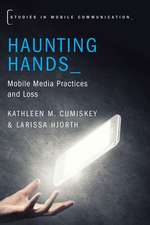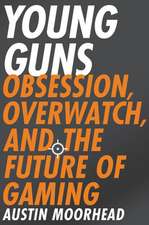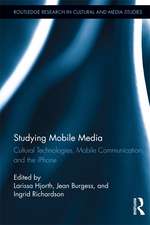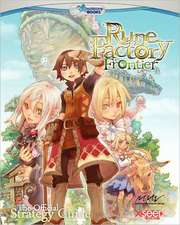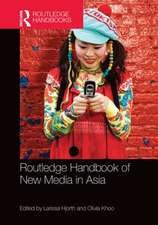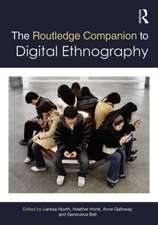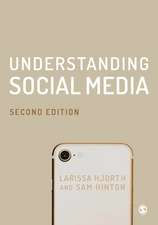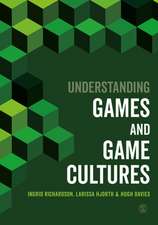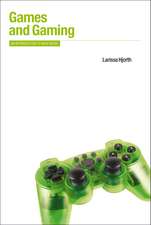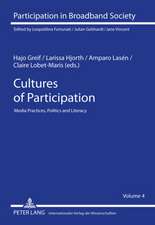Gaming Cultures and Place in Asia-Pacific: Routledge Studies in New Media and Cyberculture
Editat de Larissa Hjorth, Dean Chanen Limba Engleză Paperback – 21 feb 2012
| Toate formatele și edițiile | Preț | Express |
|---|---|---|
| Paperback (1) | 305.71 lei 6-8 săpt. | |
| Taylor & Francis – 21 feb 2012 | 305.71 lei 6-8 săpt. | |
| Hardback (1) | 825.06 lei 6-8 săpt. | |
| Taylor & Francis – 3 iun 2009 | 825.06 lei 6-8 săpt. |
Din seria Routledge Studies in New Media and Cyberculture
- 18%
 Preț: 703.51 lei
Preț: 703.51 lei -
 Preț: 364.22 lei
Preț: 364.22 lei -
 Preț: 311.54 lei
Preț: 311.54 lei -
 Preț: 310.65 lei
Preț: 310.65 lei - 9%
 Preț: 934.77 lei
Preț: 934.77 lei -
 Preț: 312.54 lei
Preț: 312.54 lei - 30%
 Preț: 848.54 lei
Preț: 848.54 lei - 18%
 Preț: 1055.51 lei
Preț: 1055.51 lei - 18%
 Preț: 1008.17 lei
Preț: 1008.17 lei -
 Preț: 442.50 lei
Preț: 442.50 lei - 17%
 Preț: 313.19 lei
Preț: 313.19 lei -
 Preț: 383.67 lei
Preț: 383.67 lei - 18%
 Preț: 1108.42 lei
Preț: 1108.42 lei -
 Preț: 451.76 lei
Preț: 451.76 lei - 49%
 Preț: 546.47 lei
Preț: 546.47 lei - 30%
 Preț: 849.84 lei
Preț: 849.84 lei - 18%
 Preț: 998.71 lei
Preț: 998.71 lei - 18%
 Preț: 1001.07 lei
Preț: 1001.07 lei - 18%
 Preț: 1002.63 lei
Preț: 1002.63 lei - 18%
 Preț: 1111.58 lei
Preț: 1111.58 lei - 18%
 Preț: 317.38 lei
Preț: 317.38 lei - 26%
 Preț: 763.39 lei
Preț: 763.39 lei - 18%
 Preț: 1056.71 lei
Preț: 1056.71 lei - 18%
 Preț: 1110.81 lei
Preț: 1110.81 lei -
 Preț: 370.35 lei
Preț: 370.35 lei - 18%
 Preț: 1057.89 lei
Preț: 1057.89 lei - 18%
 Preț: 696.82 lei
Preț: 696.82 lei -
 Preț: 384.81 lei
Preț: 384.81 lei - 30%
 Preț: 818.67 lei
Preț: 818.67 lei - 18%
 Preț: 1053.92 lei
Preț: 1053.92 lei - 18%
 Preț: 1059.28 lei
Preț: 1059.28 lei - 31%
 Preț: 766.26 lei
Preț: 766.26 lei - 18%
 Preț: 1059.84 lei
Preț: 1059.84 lei -
 Preț: 442.50 lei
Preț: 442.50 lei - 18%
 Preț: 1057.75 lei
Preț: 1057.75 lei - 18%
 Preț: 995.93 lei
Preț: 995.93 lei - 26%
 Preț: 822.01 lei
Preț: 822.01 lei - 18%
 Preț: 696.82 lei
Preț: 696.82 lei - 18%
 Preț: 1106.02 lei
Preț: 1106.02 lei
Preț: 305.71 lei
Preț vechi: 348.97 lei
-12% Nou
Puncte Express: 459
Preț estimativ în valută:
58.49€ • 61.08$ • 48.30£
58.49€ • 61.08$ • 48.30£
Carte tipărită la comandă
Livrare economică 15-29 aprilie
Preluare comenzi: 021 569.72.76
Specificații
ISBN-13: 9780415535892
ISBN-10: 0415535891
Pagini: 314
Ilustrații: 12 tables and 15 halftones
Dimensiuni: 152 x 229 mm
Greutate: 0.44 kg
Ediția:1
Editura: Taylor & Francis
Colecția Routledge
Seria Routledge Studies in New Media and Cyberculture
Locul publicării:Oxford, United Kingdom
ISBN-10: 0415535891
Pagini: 314
Ilustrații: 12 tables and 15 halftones
Dimensiuni: 152 x 229 mm
Greutate: 0.44 kg
Ediția:1
Editura: Taylor & Francis
Colecția Routledge
Seria Routledge Studies in New Media and Cyberculture
Locul publicării:Oxford, United Kingdom
Public țintă
Postgraduate and UndergraduateCuprins
List of Figures. List of Tables. Acknowledgments 1. Locating the Game: Gaming Cultures in/and the Asia-Pacific Region Larissa Hjorth and Dean Chan Section 1: Industries 2. The Politics of Online Gaming Florence Chee and Dal Yong Jin 3. Gaming Nation: The Australian Game Development Industry Sam Hinton 4. The Dynamics of New Media Globalization in Asia: A Comparative Study of the Online Gaming Industries in South Korea and Singapore Peichi Chung Section 2: Localities 5. Consuming and Localizing Japanese Combat Games in Hong Kong Benjamin Wai-Ming Ng 6. The "Bang" where Korean Online Gaming Began: The Culture and Business of the PC bang in Korea Jun-Sok Huhh 7. Lan Gaming Groups: Snapshots from an Australasian Case Study, 1999-2008 Melanie Swalwell Section 3: Genres and New Rubrics 8. Beyond the "Great Firewall": The Case of In-game Protests in China Dean Chan 9. Pokemon 151: Complicating kawaii David Surman 10. Watching StarCraft, Strategy and South Korea Christian McCrea 11. The Re-presentation of Country as Virtual Artefact in Australian Aboriginal Cultural Heritage using a Game Engine Theodor G. Wyeld, Brett Leavy and Patrick Crogan 12. Sticky Games and Hybrid Worlds: A Post-phenomenology of Mobile Phones, Mobile Gaming and the iPhone Ingrid Richardson Section 4: Players, Playing, and Virtual Communities 13. Managing Risks in Online Game Worlds: Networking Strategies Among Taiwanese Adolescent Players Holin Lin & Chuen-Tsai Sun 14. Games of Gender: A Case Study on Females who Play Games in Seoul, South Korea Larissa Hjorth, Bora Na and Jun-Sok Huhh 15. Playing the Gender Game: The Performance of Japan, Gender and Gaming via Melbourne Female Cosplayers Larissa Hjorth. Contributors. Index
Notă biografică
Dr. Larissa Hjorth is a lecturer at RMIT University and is the author of The Art of Being Mobile (London, Routledge, 2008).
Dr. Dean Chan teaches at the School of Communications and Arts, Edith Cowan University (ECU), in Perth, Australia.
Dr. Dean Chan teaches at the School of Communications and Arts, Edith Cowan University (ECU), in Perth, Australia.
Descriere
This collection explores the politics of game play and its cultural context by focusing on the Asia-Pacific region. Drawing from micro ethnographic studies to macro political economy analysis of techno-nationalisms and transcultural flows of cultural capital, it provides an interdisciplinary model for thinking through the politics of gaming.

